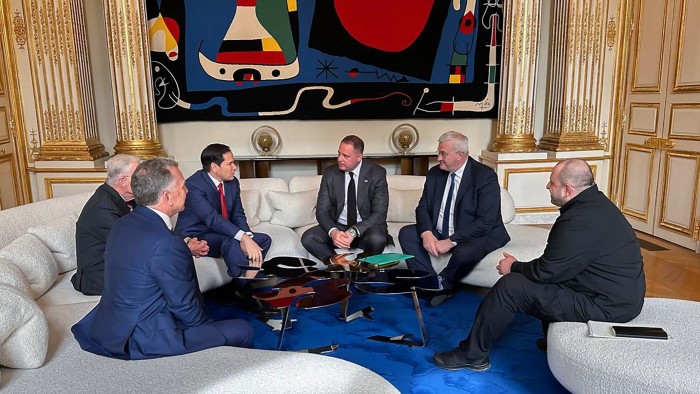Unlock the White House Watch newsletter for free
Your guide to what the 2024 US election means for Washington and the world
President Donald Trump will abandon attempting to negotiate a peace deal between Russia and Ukraine within a “matter of days” unless he sees clear signs a deal is possible, the top US diplomat has said.
Marco Rubio, US secretary of state, said on Friday that Washington would not pursue the Ukraine talks “for weeks or months” and would focus on “other priorities” if there was not a breakthrough soon.
“If it’s not possible, if we’re so far apart that this is not going to happen, then I think the president is at a point where he is going to say, well, we’re done,” Rubio told reporters on Friday.
Hours after his remarks US vice-president JD Vance struck a more upbeat tone, saying there had been positive developments in talks even within the past 24 hours.
“We do feel optimistic that we hopefully can bring this war — this very brutal war — to a close,” Vance said at the start of a meeting in Rome with Italy’s Prime Minister Giorgia Meloni, a staunch supporter of Kyiv.
The contrasting statements from US officials follow a day-long meeting in Paris on Thursday hosted by French President Emmanuel Macron that was attended by a US delegation, including Rubio and special envoy Steve Witkoff, alongside officials from Ukraine, UK and Germany.
“We’re not going to continue to fly all over the world and do meeting after meeting after meeting if no progress is being made,” Rubio said. The US wants to figure out “in a matter of days, not weeks”, if a peace is attainable, he said, adding that Trump “felt strongly” that the talks could not drag on.
Rubio did not elaborate on what the implications would be for US military support to Ukraine if Trump abandoned the effort to broker a peace between Moscow and Kyiv. During his presidential campaign Trump said he would end the war within “24 hours” but after taking office set his team a 100 day target, a period that concludes later this month.
The Paris gathering aimed to jump-start talks that have stalled since Trump re-engaged with Russian President Vladimir Putin in February and pressured Ukrainian leader Volodymyr Zelenskyy to negotiate a settlement. Ukraine has said since that it is open to a temporary ceasefire, but Russia has delayed.
“If both sides are serious, then we want to help, but if it’s not going to happen, then we’re just going to move on to other topics that are equally if not more important for the US,” Rubio said.
Dmitry Peskov, the Kremlin spokesperson, said on Friday that there had been “progress” in talks but that “many difficult discussions still lie ahead”.
Ukraine said on Thursday that it had signed a preliminary agreement with the US over sharing its mineral and energy resources, which has been a key demand from Trump, who sees it as a way to pay back the US for billions of dollars in military aid.
Such an accord had been close to being signed in February but was derailed by an argument between Trump and Zelenskyy in the Oval Office.
Rubio said the talks in Paris were “very positive” and that the involvement of European countries had been constructive. Another meeting in a similar format will be held next week in London to allow the US to get Russian input and for Ukraine to decide on its positions.
A French official said Thursday’s gathering was significant because it began “a new positive process” in peace talks that this time had more involvement from European countries.
The talks were the first high-level, in-person talks in the US’s efforts that have included European powers directly. A British official also said the discussion felt significant regarding the US getting to the same position as Europeans on Putin’s lack of commitment to peace plans.
“The UK, France and Germany can help us move the ball on this and get this closer to a resolution,” Rubio said.
Rubio declined to describe the framework that the US has put on the table at this stage. He added that it was too early to make definitive decisions on security guarantees, although they had been discussed.
Ukraine has pushed hard for such guarantees, especially regarding its ability to maintain and build up a strong army to defend itself, and its European allies have also emphasised their importance.
Read the full article here
